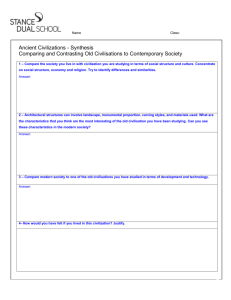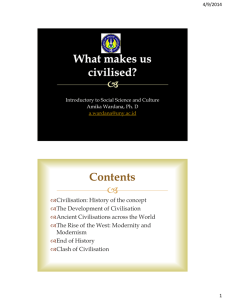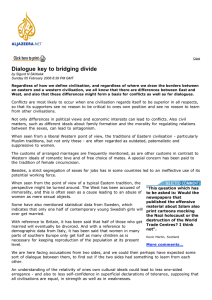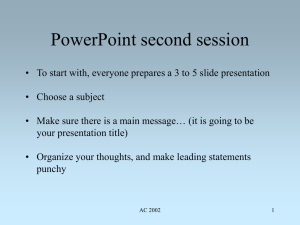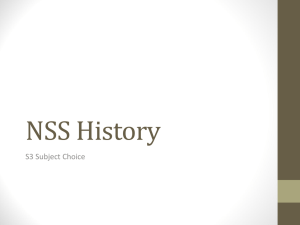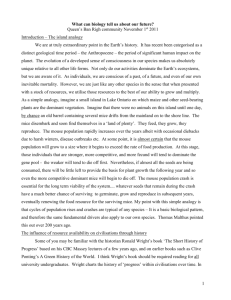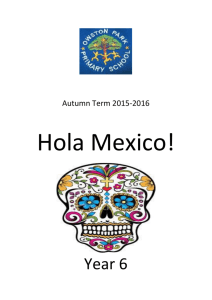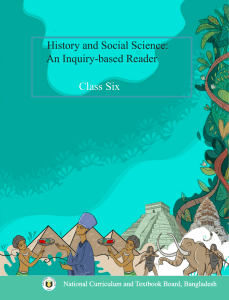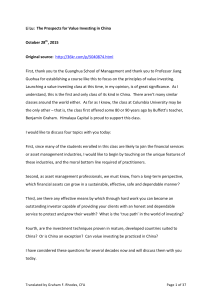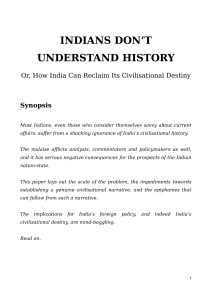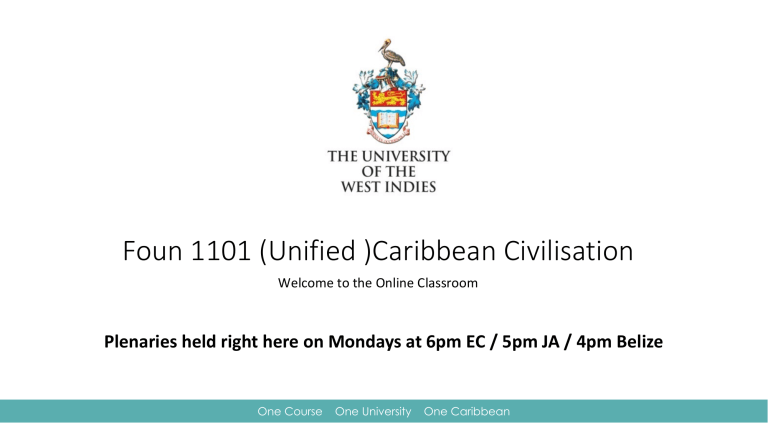
Foun 1101 (Unified )Caribbean Civilisation Welcome to the Online Classroom Plenaries held right here on Mondays at 6pm EC / 5pm JA / 4pm Belize One Course One University One Caribbean (UNIFIED) FOUN 1101: CARIBBEAN CIVILISATION Plenary #1 Monday 4th February, 2019 Ms Lynette Sampson 2 REVISIONSIM – TO REVISE • New sources • To tell the story of those left out of history • Broader perspectives from different vantage points • New developments in science and technology – new information Why is the past important to us today? • The past is important to our sense of identity • The past validates allows us to legally validate our current actions and understandings • It provides us with familiarity with the past • It serves as a form of escapism The Value of the Past to the Present “The past is a foreign country” - David Lowenthal To visit, we need a passport, which consists of: - intellectual tools - methodology used to recover and interpret the past. Can we consider what was not written down, a part of history? Pre-literate vs Pre-historic • History is considered to be all that has ever happened in the past. • Pre-literate recognizes • human civilisations also which do not record their existence in forms of writing • history existed long before the art of writing was invented Primary sources • A primary source or document is a contemporary source. It has been generated at the same time of the focus of the study. • Document • Artefact • Other form of evidence • It may be written or non-written 9 Secondary sources • Secondary sources are created from primary sources; they are interpretations of the primary sources • These may be written or non-written 10 Methodology • External criticism is concerned with confirming the authenticity of a document • Internal criticism determines the historical value or use that can be made of the source 11 Development of Civilisation Palaeolithic Era • Earliest humans- Nomadic - follow food • Hunting, gathering, fishing Neolithic Era • 2500BCE- Settlement • animal husbandry and plant cultivation established Neolithic Revolution cont’d • Population growth • Increase harvest through irrigation = increase in pop • Growth of towns, cities etc = infrastructure, industry, commerce • Specialised occupations and Social division • Development of expressions of communal identity- writing, religion, music, art Consider how we use these words: •Primitive •Tribe / Tribal •Civlised / Civilisation Civilisation A collective expression of a group of people expressed through the peculiar world view they share. The tangible expression of a communal understanding. A grouping of societies and their individual cultures, conjoined by their sharing of deep historical roots. Culture • A representation of practices, lifestyles, views and ways of life that vary between and among different groups of people all over the world. • A body of beliefs and practices in terms of which a group of people understand themselves and the world and organize their individual and collective lives. • Culture can unite or divide. • Culture is a subset of civilisation • Shared practices and values Civilisations are different Difference represents diversity not a hierarchy of better or worse Civilisations are often “ranked” based certain cultural markers, such as • Literacy • System of organising society • Religion • Art Each culture and civilisation should be assessed on its own inherent values and merits Oral History vs Oral Tradition • Oral History - the presentation of source material by word of mouth by one who was witness to the event. • This person is referred to as an informant. • Oral Tradition - historical information concerning the cultural norms of a particular civilisation passed on for generations • Not necessarily by an informant Ethnocentrisim The tendency to judge others based on one’s one world view, where one viewpoint is taken as the standard and usually seen as superior to the other being perceived.
